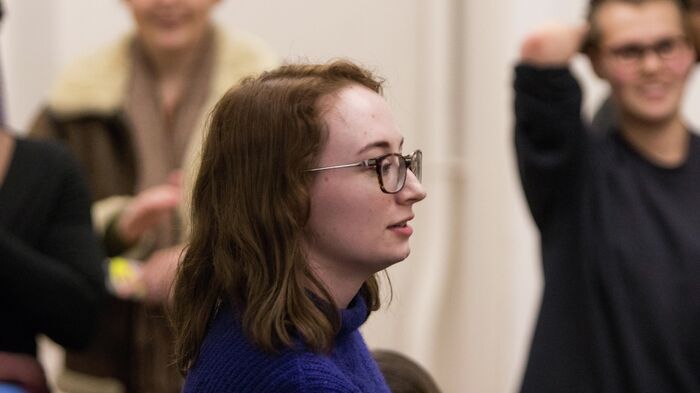
Varsity’s verdict: Aspinall’s victory is a staggering campaign success – but the real work is ahead
CUSU’s new leader needs to build consensus, which means learning from the lessons of the past

Last night’s CUSU election results appear to have split Cambridge down the middle.
Evie Aspinall faces a huge challenge in the year ahead: when a campaign centres on engagement, it opens itself up to failing in the quagmire of CUSU outreach efforts.
Aspinall’s win, along with the huge number of RONs in the uncontested elections, demonstrate that the ‘disillusioned’ are a powerful voting bloc. But mobilising this force for something more than just performative will prove challenging.
Two of Aspinall’s chief promises in this area have been to make CUSU Council more engaging, and to post more video blogs.
These ideas are not new: in fact, they are basically the exact policies that Amatey Doku and Daisy Eyre ran on. This may well have been conscious: after all, both Doku and Eyre won by appearing to be a reasonable centre-left candidate and focusing on engagement. They also both already enacted the policies Aspinall is suggesting: Eyre has made a series of adjustments to Council through this year, and the current sabbatical team frequently posts videos.
Aspinall needs not only to figure out what has gone wrong with previous attempts – and preserve what has been done right – but also find ways to go beyond the superficial.
“The battle to avoid disengagement can be lost before sabbatical officers already realise it has begun”
Aspinall’s campaign and supporters have made an attempt to paint her lack of experience for the role, and disengagement with CUSU until this year, as advantageous, and have attempted to dismiss any coverage that highlights these weaknesses as a product of either media bias, or proof of ‘insider’ politics at work.
These assertions may work to buoy campaigners, but they will not pass in the real world.
When Aspinall takes up her new post in July, the excitement of election season will be ancient history, and many of her allies and supporters will have left the University. She will face the huge challenge of engaging a notoriously passive student body, almost a third of whom will be fresher undergraduates. For them, she will be CUSU’s institutional face, linked with all its problems, including those she ran in opposition to. The battle to avoid disengagement can be lost before sabbatical officers already realise it has begun.
The promises of both MacDonald and Wei’s campaigns: to unite JCRs and campaigns, to provide centralised support for groups and facilitate change through the provision of reliable information is the ideal role CUSU can play at this University, and the one it can do most credibly.
For the activist student left, the results are a tough lesson. Cambridge students have elected centrists who have spoken of a wish to improve the student union’s image for three years now. That perception of CUSU as disconnected or unaccountable is not going away, despite years of efforts to tackle it. The number of RON votes (particularly in the education officer vote), and the substantial number of students who voted ‘anyone but Wei’ (first preferencing MacDonald, and second preferencing Aspinall) should not be ignored. For the years, many of these positions have been effectively divvied out among finalists from the left: it’s clear that there is growing appetite for a change.
The timing is especially difficult because this has been an incredibly successful year for the student left: ‘disillusioned’ students may claim to feel alienated, but they still benefit from rent freezes, and with no apparent appetite to alter CUSU’s stances on the strikes and divestment, must admit that it is the student left who are leading progress on these fronts, almost by default.
Aspinall may have taken the victory, but Wei won the plurality of first preference votes, undoubtedly including most of the first preferences of the people most engaged with CUSU: those involved in the liberation campaigns.
Aspinall faces the classic challenge of finding a way to unite this group with her own voter bloc. It is difficult to see any reason why next year will be substantially different to any other: once the goodwill has faded, it is the students who want to engage with the student union who will become its footsoldiers. As ever, they will be those who most need the student union, as a way to fight against their own marginalisation.

All the election news, in one place
Comprehensive news and analysis on the CUSU/GU elections, collected.
Visit Varsity’s Elections 2018 hub.
 Comment / Cambridge students are too opinionated 21 April 2025
Comment / Cambridge students are too opinionated 21 April 2025 Interviews / Meet the Chaplain who’s working to make Cambridge a university of sanctuary for refugees20 April 2025
Interviews / Meet the Chaplain who’s working to make Cambridge a university of sanctuary for refugees20 April 2025 News / News in brief: campaigning and drinking20 April 2025
News / News in brief: campaigning and drinking20 April 2025 Comment / Cambridge’s tourism risks commodifying students18 April 2025
Comment / Cambridge’s tourism risks commodifying students18 April 2025 Comment / Does the AI revolution render coursework obsolete?23 April 2025
Comment / Does the AI revolution render coursework obsolete?23 April 2025





